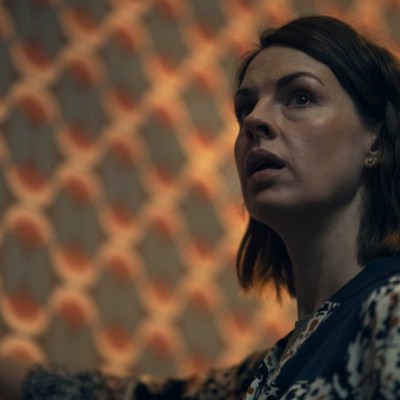Warning: contains season one spoilers (but NOT for season two).
First things first: The Devil’s Hour has already filmed its third (and, presumably, final) season, so there’s no fear of Tom Moran’s complex story being left without an ending. Enter season two armed with confidence, then, along with a stack of notebooks, Post-Its, several pieces of red string, and a blister pack of headache pills to keep track of its plot.
That’s an exaggeration. By the end of season one, it all broke down fairly simply if you just see Peter Capaldi’s sinister character Gideon Shepherd as like Bill Murray’s in Groundhog Day, but instead of reliving a single day in an endless loop, Gideon endlessly relives whole lifetimes; and instead of trying to rearrange things each time with the end goal of getting Andie MacDowell into bed, Gideon does it to stop murderers, paedophiles and rapists.
The Devil’s Hour season one suffered from a surfeit of ideas. The story of Lucy Chambers (Jessica Raine), her strange son Isaac (Benjamin Chivers), and her strange habit of waking each night at precisely 3:33 a.m. was at least three shows in one: a supernatural horror, a crime thriller, and eventually, a multiverse mystery. Being only the first part of this story, it couldn’t satisfactorily pay off any of its great promise. There was a little too much head-scratching uncertainty as the plot dodged around being spooky and evasive.
In season two, that all changes. The multiverse element now established, the whole thing stands on more solid ground, giving The Devil’s Hour a reliable foundation from which to really kick things off. The character relationships are less chilly and distanced, making it easier to invest emotionally, and instead of a gradually unpeeling mystery, there’s a much more focused action-style plot. Kudos to directors Johnny Allen and Shaun James Grant for making the various timelines and flashbacks easy to parse without being patronising. What hieroglyphics they must have used to mark up the shooting scripts and keep everything straight on screen.
In short: this time Gideon and Lucy must work together to foil a monstrous event. With a bounty on his head, she’s forced into the field to confront potential foes, all the while trying to cope with her son and mother’s loosening grip on this timeline. It’s streamlined and fast-paced and builds towards a clear goal without losing the wiggy reality-shifting attractions of season one.
Having only five episodes instead of six like the first season, you’d think the result would be more overstuffed incoherence, but the reverse is true. This story benefits from being straitened. In flashback, we get answers about the alt version of Lucy who turned up in the season one finale, which make sense of so many of season one’s tantalising “glitches”. There’s a good reason that Lucy saw the flowers in Isaac’s child therapist office switch between paper roses and real blooms. There’s a good reason, it’s revealed, for every weird little thing teased in season one.
None of which would mean much if the characters didn’t inspire some pathos. This time, their various tragedies are easier to read, making them all easier to root for. A brief visual scene from Isaac’s perspective opens up the extreme loneliness of his unbound life. Another lets us briefly inside the haunting terror of Gideon’s world. Peter Capaldi continues to be the perfect casting for Gideon thanks to his somewhat unique talent of being able to sell ‘dangerously twisted maniac’ and ‘vulnerable, desperate soul’ with equal convincingness. Elsewhere, Nikesh Patel does a good job as a romantic lead, and Jessica Raine does a good job of everything.
Particularly this time, Lucy’s love for her unusual son burns out of Raine in their scenes together. Considering that several of those scenes – for plot reasons, plus that pesky habit child actors have of growing – were filmed alongside season one’s, it must be story as well as performance that’s started to kick in there. Now in possession of the key to Isaac’s strange behaviour and gnomic pronouncements, he transforms from a sad question mark into a tragic character whose fate you care about, and his and Lucy’s relationship moves satisfyingly centre-stage. Ever since Lucy defended Isaac from being called a soulless husk by Gideon in season one, the mother and son have been a double act you really want to see win.
Will Lucy and Isaac win? That’s for season three to tell, but it’s worth saying that The Devil’s Hour is no optimist. This is a drama about people doing terrible things. There’s an arch Utopia-like sense of gallows humour in this season, which scores the worst events with ironically upbeat soundtrack hits and colourful montages. Its darkly confrontational approach won’t be for everybody, and perhaps neither will be the intensity of its heightened performances.
This twisted British thriller is based on a very cool central idea from Tom Moran though, and one that provides a satisfyingly eerie explanation for real-world experiences like déjà-vu, childhood imaginary friends, or dogs barking at thin air. Able to give more away, season two is less eerie and mysterious but it’s ultimately more satisfying. And an adult fantasy with a beginning, a middle, and an already-filmed end? An increasingly rare thing.
The Devil’s Hour season two arrives on Prime Video on Friday October 18.
The post The Devil’s Hour Season 2 Review: Clever Supernatural Thriller Finds its Focus appeared first on Den of Geek.




0 Commentaires